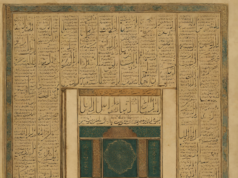
Definition and Understanding of the term from the Quran and the Ahlul Bayt (AS).
Al-Islaah keep referencing the danger of Ghuluww and how the Twelver Shia narrative today has become embroiled in something that the Quran and the Imams (as) clearly warned us against. However, there is a need to define what the term Ghuluww means and what is classified as Ghuluww. This article will seek to understand Ghuluww from both Quran and authentic narrations of the Aimmah (as).
What is Ghuluww?
From the Quran:
يَـٰٓأَهْلَ ٱلْكِتَـٰبِ لَا تَغْلُوا۟ فِى دِينِكُمْ وَلَا تَقُولُوا۟ عَلَى ٱللَّهِ إِلَّا ٱلْحَقَّ ۚ إِنَّمَا ٱلْمَسِيحُ عِيسَى ٱبْنُ مَرْيَمَ رَسُولُ ٱللَّهِ وَكَلِمَتُهُۥٓ أَلْقَىٰهَآ إِلَىٰ مَرْيَمَ وَرُوحٌۭ مِّنْهُ ۖ فَـَٔامِنُوا۟ بِٱللَّهِ وَرُسُلِهِۦ ۖ وَلَا تَقُولُوا۟ ثَلَـٰثَةٌ ۚ ٱنتَهُوا۟ خَيْرًۭا لَّكُمْ ۚ إِنَّمَا ٱللَّهُ إِلَـٰهٌۭ وَٰحِدٌۭ ۖ سُبْحَـٰنَهُۥٓ أَن يَكُونَ لَهُۥ وَلَدٌۭ ۘ لَّهُۥ مَا فِى ٱلسَّمَـٰوَٰتِ وَمَا فِى ٱلْأَرْضِ ۗ وَكَفَىٰ بِٱللَّهِ وَكِيلًۭا
O People of the Scripture, do not commit excess in your religion or say about Allāh except the truth. The Messiah, Jesus the son of Mary, was but a messenger of Allāh and His word which He directed to Mary and a soul [created at a command] from Him. So believe in Allāh and His messengers. And do not say, “Three”; desist – it is better for you. Indeed, Allāh is but one God. Exalted is He above having a son. To Him belongs whatever is in the heavens and whatever is on the earth. And sufficient is Allāh as Disposer of affairs (Quran 4:171).
And in another place:
قُلْ يَـٰٓأَهْلَ ٱلْكِتَـٰبِ لَا تَغْلُوا۟ فِى دِينِكُمْ غَيْرَ ٱلْحَقِّ وَلَا تَتَّبِعُوٓا۟ أَهْوَآءَ قَوْمٍۢ قَدْ ضَلُّوا۟ مِن قَبْلُ وَأَضَلُّوا۟ كَثِيرًۭا وَضَلُّوا۟ عَن سَوَآءِ ٱلسَّبِيلِ
Say, “O People of the Scripture, do not exceed limits (Taghlu/ from Ghuluw) in your religion beyond the truth and do not follow the inclinations of a people who had gone astray before and misled many and have strayed from the soundness of the way.” (Quran, 5:77)
These verses have been addressed to the earlier communities who followed previous scriptures, like many other verses in the Quran. Allah (swt) on many occasions, mentions the stories of past nations as an example for us, and to warn us, so that we don’t repeat the same mistakes they made. Therefore, although the above verses have been addressed to the previous communities, they have a message for us: “Do not commit Ghuluww in religion”.
Now let’s look at some narrations from the Imams (as) on the specific type of Ghuluww we are talking about.
From the Aimmah (AS)
Definition of Ghuluww: Based on the numerous narrations we have received from the Ahlulbayt (as), the definition of “Ghuluww” is as follows: “Claiming something about the Ahlulbayt (as) which they themselves did not claim about themselves.”
Let’s see some examples of these narrations:
Hadith 1: Hamid ibn Ziyad has narrated from al-Hassan ibn Muhammad ibn Sama’a from certain individuals of his people from Aban from ‘Amr ibn Khalid from abu Ja’far, who has said the following:
“Abu Ja’far (Imam Baqir a.s), has said, ‘O the community of Shi’a of the household of Muhammad (s), be the central support (take the middle path) so that both al- Ghali (exxagerators) and al-Tali (those left behind) refer to you. A man from Ansar (people of Madina) called Sa’d, said, ‘May Allah keep my soul in service for your cause, what is the meaning of al-Ghali?’ The Imam said, ‘They are the people who say about us what we do not say about ourselves. Thus, they are not of our people and we are not of their people.’
The man then asked, ‘Who are al-Tali?’ The Imam said, ‘They are those who search for good. They receive the good and are rewarded for it.’
The Imam then turned to us and said, ‘I swear by Allah that we do not possess any amnesty from Allah and there is no family relation between Allah and us nor do we possess any authority over Allah. We do not seek nearness to Allah through any other means but obedience to Him. Whoever of you is obedient to Allah, it will benefit him, and whoever of you is disobedient to Allah, our guardianship, Wilayah, will not benefit him. What is the matter with you? Do not be misled! What is the matter with you? Do not be misled!’” (Usul al Kafi, Vol 2, Book of Belief and Disbelief, Ch 32, H 6)


Hadith 2: Same narration has been quoted in the book Mishkat al Anwar
Amr ibn Yazeed narrated that Imam Baqir (a.s) said: ‘O the community of Shi’a of the household of Muhammad (s), be the central support (take the middle path) so that both al- Ghali (exxagerators) and al-Tali (those left behind) refer to you.
’A man from Ansar (people of Madina) called Sa’d, said, ‘May Allah keep my soul in service for your cause, what is the meaning of al-Ghali?’ The Imam said, ‘They are the people who say about us what we do not say about ourselves. Thus, they are not of our people and we are not of their people.’ The man then asked, ‘Who are al-Tali?’ The Imam said, ‘They are those who search for good. They receive the good and are rewarded for it.’
The Imam then turned to us and said, ‘I swear by Allah that we do not possess any amnesty from Allah and there is no family relation between Allah and us nor do we possess any authority over Allah. We do not seek nearness to Allah through any other means but obedience to Him. Whoever of you is obedient to Allah, it will benefit him, and whoever of you is disobedient to Allah, our guardianship, Wilayah, will not benefit him. What is the matter with you? Do not be misled! What is the matter with you? Do not be misled!’” (Mishkat al anwar Fi Ghurar al Akhbar, H 304)


Hadith 3: While condemning a Ghali (exaggerator) called Mughira ibn Sa’eed, Imam Sadiq (as) repeats the definition of “Ghuluww”.
The Imam (as) says “…..May the curse of Allah (swt) be on those who claim about us what we have not claimed about ourselves…” (Rijal al Kashi, Ch 98 – On Mughira ibn Sa’eed, Hadith 400).
May the curse of Allah (swt) be on those who claim about us what we have not claimed about ourselves
Imam Al-Sadiq (as)
Is Ghuluww Bad?
In the previous section, while ascertaining the definition of Ghuluww, we also came across many curses of the Imams (as) on such people pacticing it. Let us look at some more narrations about the stance of the Imams (as) on Ghuluww.
Hadith 1: In saying no. 116 of Nahjul Balagha, and numerous other books, Imam Ali (as) is quoted to have said:
يهلك في اثنان: محب غال و مبغض قال.
Two kinds of people will be damned on my account. Those who form exaggerated opinion about me out of love and those who under-estimate me because of hatred.
Hadith 2 & 3: Bihar al Anwar, Vol 25, there is a full chapter about those who exaggerate (Ghulat), we will just quote two narrations from it.
Allah (swt) says in the Quran “Do not exaggerate in your religion and do not say about Allah (swt) except the truth”, and Imam Ali (as) said “O Allah (swt), I dissociate myself from the Ghulat (exaggerators) like Jesus (as)’s dissociation from the Christians.”
Imam Sadiq (as) says “The Ghulat (exaggerators) are the worst of Allah’s creation, they belittle Allah (swt) and they claim lordship for his servants, I swear by Allah (swt), the Ghulat are worse than the Jews, Christians, Majoos and all those who associate with Allah (swt).”


Hadith 4: In Al Amali of Sheikh Toosi, pg 650, it has been narrated:
Through Abdul Rahman bin Muslim, from Fudhayl bin Yasaar, who said: Imam Sadiq (as) said: “Watch out for your youth and be vigilant in protecting them from the Ghulaat (extremists) lest they corrupt their minds, because the Ghulaat are the worst of God’s creation: they belittle the greatness of Allah, and they claim divine attributes and qualities for the servants of Allah. I swear by Allah, the Ghulaat (extremist Shias) are worse than the Jews and the Christians and the Majoos and the (conventional) polytheists……”


Similarly in many other narrations, the Imams (as) clearly say that those who exaggerate our position (The Ghulat) are disbelievers (Kuffar) and they are worse than all other deviated people.
The Imams (as), due to their experience of the Ghulat in their own time, and due to their far sightedness, knew how dangerous this disease of Ghuluw is, and how it can take people away from the correct religion and make them invent beliefs, innovations and rituals which have no basis in Islam.
This is the reason why the Imams (as) warned us, by harshly condemning and cursing the Ghulat, so that we take all the necessary precautions in order to keep ourselves safe from this deadly disease of Ghuluww.
Examples of Ghuluww in current-day narratives:
Belief that Allah (swt) has given the Prophet (saww) and Imams (as) the authority of creation (khalq) and sustenance (rizq)
It should be noted that people who gave the Imams (as) Godly attributes were called Ghali/Ghulat, and those who believed that Allah (swt) has delegated (Tafweed) the affair of creation and sustenance to the Ahlulbayt (as) were called “Mufawweda”. These groups were active during the lives of many Imams (as), and were condemned and cursed by the Imams (as).
In the book “Al Etiqadat” of Sheikh al Saduq, he writes about the beliefs of the Shia. It should be kept in mind that Sheikh al Saduq was indisputably one of the greatest scholars of the Shia, and his books lay the foundation of Shia faith.
Sheikh Abu Ja’far (Saduq) says: Our belief concerning the “Ghulat” and “Mufawweda” is that they are “Kuffar” (deniers) of Allah (swt). They are more wicked than the Jews and Christians, Fire worshippers, the Qadarites or the Kharijites or any of the innovators (Ahlul Bidat) or those who hold views that lead astray…. (Al Eteqadat, Arabic text, Ch 37 “Chapter of belief concerning denial of Ghuluw and Tafweed”)


Under the same chapter, Sheikh Saduq quotes a hadith from Imam al Ridha (as):

Imam al-Riḍā (as) used to say in his Duʿā’ (Supplication) to Allah (SWT):
وَكَانَ الرِّضَا – عَلَيْهِ السَّلَامُ – يَقُولُ فِي دُعَائِهِ : «اللَّهُمَّ إِنِّي أَبْرَأُ إِلَيْكَ مِنَ الْحَوْلِ وَالْقُوَّةِ، فَلَا حَوْلَ وَلَا قُوَّةَ إِلَّا بِكَ.
اللَّهُمَّ إِنِّي أَبْرَأُ إِلَيْكَ مِنَ الَّذِينَ ادَّعَوْا لَنَا مَا لَيْسَ لَنَا بِحَقٍّ.
اللَّهُمَّ إِنِّي أَبْرَأُ إِلَيْكَ مِنَ الَّذِينَ قَالُوا فِينَا مَا لَمْ نَقُلْهُ فِي أَنْفُسِنَا.
اللَّهُمَّ لَكَ الْخَلْقُ وَمِنْكَ الْأَمْرُ، وَإِيَّاكَ نَعْبُدُ وَإِيَّاكَ نَسْتَعِينُ.
اللَّهُمَّ أَنْتَ خَالِقُنَا وَخَالِقُ آبَائِنَا الْأَوَّلِينَ وَآبَائِنَا الْآخِرِينَ.
اللَّهُمَّ لَا تَلِيقُ الرُّبُوبِيَّةُ إِلَّا بِكَ، وَلَا تَصْلُحُ الْإِلَهِيَّةُ إِلَّا لَكَ، فَالْعَنِ النَّصَارَى الَّذِينَ صَغَّرُوا عَظَمَتَكَ، وَالْعَنِ الْمُضَاهِينَ لِقَوْلِهِمْ مِنْ بَرِيَّتِكَ.
اللَّهُمَّ إِنَّا عَبِيدُكَ وَأَبْنَاءُ عَبِيدِكَ، لَا نَمْلِكُ لِأَنْفُسِنَا ضَرّاً وَلَا نَفْعاً وَلَا مَوْتاً وَلَا حَيَاةً وَلَا نُشُوراً.
اللَّهُمَّ مَنْ زَعَمَ أَنَّنَا أَرْبَابٌ فَنَحْنُ إِلَيْكَ مِنْهُ بِرَاءٌ، وَمَنْ زَعَمَ أَنَّ إِلَيْنَا الْخَلْقَ وَعَلَيْنَا الرِّزْقَ فَنَحْنُ إِلَيْكَ مِنْهُ بِرَاءٌ كَبَرَاءَةِ عِيسَى – عَلَيْهِ السَّلَامُ – مِنَ النَّصَارَى.
اللَّهُمَّ إِنَّا لَمْ نَدْعُهُمْ إِلَى مَا يَزْعُمُونَ، فَلَا تُؤَاخِذْنَا بِمَا يَقُولُونَ وَاغْفِرْ لَنَا مَا يَزْعُمُونَ.
((رَبِّ لا تَذَرْ عَلَى الْأَرْضِ مِنَ الْكافِرِينَ دَيَّاراً. إِنَّكَ إِنْ تَذَرْهُمْ يُضِلُّوا عِبادَكَ وَلا يَلِدُوا إِلَّا فاجِراً كَفَّاراً)).
O Allah, I declare my innocence before you, and disassociate from/renounce the attribution of Divine Power and Strength from myself; for there is no power or strength except with You.
O Allah, O Allah, I declare my innocence before you, and disassociate from/renounce the claims of those who have made (exaggerated) claims about us which are not true.
O Allah, I declare my innocence before you, and disassociate from/renounce the statements of those who have claimed about us that which we have not claimed for ourselves.
O Allah, to You belongs Creation and Authority/Command, and it is You alone whom we worship, and from You alone we seek help (across the curtain of Ghayb).
O Allah, You are Our Creator, and the Creator of our ancestors who came before us, the early and the latter.
O Allah, Rubūbiyyah (Sustainership of the universe) befits no one except You, and Divinity is only appropriate for You. So Send your Laʿnah (wrath) on the Christians who belittled Your greatness, and Send your Laʿnah (wrath) on all those whose beliefs and claims resemble their exaggerated beliefs and claims from among your creation.
O Allah, we are Your slaves, and the offspring of Your slaves. We do not control for ourselves ANY harm nor benefit, nor do we have any control over death or life, or resurrection.
O Allah, whoever claims that we are Arbāb (pl. of Rabb, i.e. sustainers), then we declare our innocence and disassociate ourselves from such claimants, in the same manner as ʿĪsā, the son of Maryam (as), will declare his innocence, and disassociate himself, from the exaggerated beliefs and claims of the Christians regarding him.
O Allah, we have not called/invited them to what they claim (about us), so do not take us to task or punish us for what they say, and forgive us for what they attribute to us (of heresy and blasphemy).
O Lord, do not leave on the earth any dwelling of the disbelievers. Indeed, if You leave them, they will lead Your servants astray and produce nothing but wicked disbelievers. (Qur’ān: 71: 26-27).
He (Shk Saduq) quotes another hadith from Imam as Sadiq (as):

And it is related from Zurara that he said: I said to Imam Ja’far as-Sadiq that a man from among the descendants of Abdu’l-lah ibn Saba’ is a believer in (the doctrine of) delegation (tafwid).
And he said: And what is tafwid? I (Zurara) said: According to him Allah (swt), (in the first instance) created Muhammad and ‘Ali, and then delegated the matter (of creation) to them, and these two created and gave sustenance, and caused life and death.
The Imam said: He, the enemy of Allah, has lied. When you return to him recite to him the verse of the Chapter of The Thunder (Ra’ad ch 13): “Or assign they unto Allah partners who created the like of His creation so that the creation (which they made and His creation) seemed alike to them? Say: Allah is the Creator of all things, and He is the One, the Almighty” (13:16). Then I went to the man and informed him of what Imam Ja’far as-Sadiq had said: And he became as if I had forced him to swallow stones or as though he were struck dumb.
In the book “Uyun Akhbar al Ridha” which is also an early book of hadith written by Sheikh al Saduq, in which he compiles the narrations from/about Imam al Ridha (as).
Muhammad ibn Ali Majilawayh narrated that Ali ibn Ibrahim ibn Hashem quoted on the authority of his father, on the authority of Yasir, the servant: I asked Al-Ridha (as),“What do you think about turning over the affairs (Tafweed)? He (as) answered, “Allah (swt) has turned over the affairs of His Religion to His Prophet (saww) and said, “…So take what the Apostle assigns to you, and deny yourselves that which he withholds from you..” (59:7). God, however, will not turn over the affairs of Creation and provision of the sustenance to the Prophet (saww).”
Then Al-Ridha (as) added, “In fact, the Honorable the Exalted God said, ‘…Allah is the Creator of all things…’ (39:62)
God also said, ‘It is Allah Who has created you: further, He has provided for your sustenance; then He will cause you to die; and again He will give you life. Are there any of your (false) ‘partners’ who can do any single one of these things? Glory be to Him! and high is He above the partners they attribute (to him)!’” (30:40) (Uyun Akhbar al Ridha, Vol 2, chapter 46, Hadith 3)
In the very next narration:
Muhammad ibn Ali ibn Abi Bashshar – may God be pleased with him – narrated that Abul Faraj al-Mudhaffar ibn Ahmad ibn AlHassan al-Qazvini quoted on the authority of Al-Abbas ibn Muhammad ibn Qasim ibn Hamza ibn Musa ibn Ja’far (as), on the authority of Al-Hassan ibn Sahl al-Qummi, on the authority of Muhammad ibn Khalid, on the authority of Abi Hashem al-Ja’fari that he had asked Abal Hassan Al-Ridha (as) about the “Ghulat” and those who believed in (God) turning over the affairs (Tafweed).
The Ghulat are unbelievers (Kuffar) and those who believe in (God) turning over the affairs (to the Prophet (saww) and Ahlulbayt (as)) (i.e tafweed) are polytheists.
Imam Al-Ridha (as)
The Imam (s) replied, “The Ghulat are unbelievers (Kuffar) and those who believe in (God) turning over the affairs (to the Prophet (saww) and Ahlulbayt (as)) (i.e tafweed) are polytheists. Whoever associates with them; visits them; eats or drinks with them; becomes related to them; gives a daughter in marriage to or marries with one of their daughters; grants them immunity; considers them honest in keeping what they are entrusted with; or acknowledges what they say or assists them in what they say has exited from the circle of the Mastery of the Honorable the Exalted God, the Mastery of God’s Prophet (s) and the Mastery of us – the Members of the Holy Household.” (Uyun Akhbar al Ridha, Vol 2, chapter 46, Hadith 4)


Same narration is quoted in Bihar al Anwar, Volume 25, of Allama al Majlisi.
Abi Hashem al-Ja’fari that he had asked Abal Hassan Al-Ridha (s) about the “Ghulat” and those who believed in (God) turning over the affairs (Tafweed). The Imam (s) replied, “The Ghulat are unbelievers (Kuffar) and those who believe in (God) turning over the affairs (to the Prophet (saww) and Ahlulbayt (as)) (i.e tafweed) are polytheists. Whoever associates with them; visits them; eats or drinks with them; becomes related to them; gives a daughter in marriage to or marries with one of their daughters; grants them immunity; considers them honest in keeping what they are entrusted with; or acknowledges what they say or assists them in what they say has exited from the circle of the Mastery of the Honorable the Exalted God, the Mastery of God’s Prophet (s) and the Mastery of us – the Members of the Holy Household.” (Bihar al Anwar, vol 25, Arabic text, Ch Rejection of Ghuluw, Hadith 19)


From the references and the explanation presented above, it is fairly evident how strictly Allah (swt) in the Quran, and the Aimmah (as) in their authentic works treat this issue of ghuluw (excess/exaggeration) and tafweedh (delegation). The Imams (as) never ascribed any elements of divinity to themselves and warened against and cursed thos who ascribed such qualities to them.
That begs the question then: How did the current-day narrative end up including so much ghuluww and tafweedh? From where did these narrative originiate? The answer to that is provided in our article titled: How and why were the narrations from the Aimmah (as) fabricated?
Appreciation: Thank you to the Shia Reformist website for sharing some of its resources with Al-Islaah.org to publish on this website.





